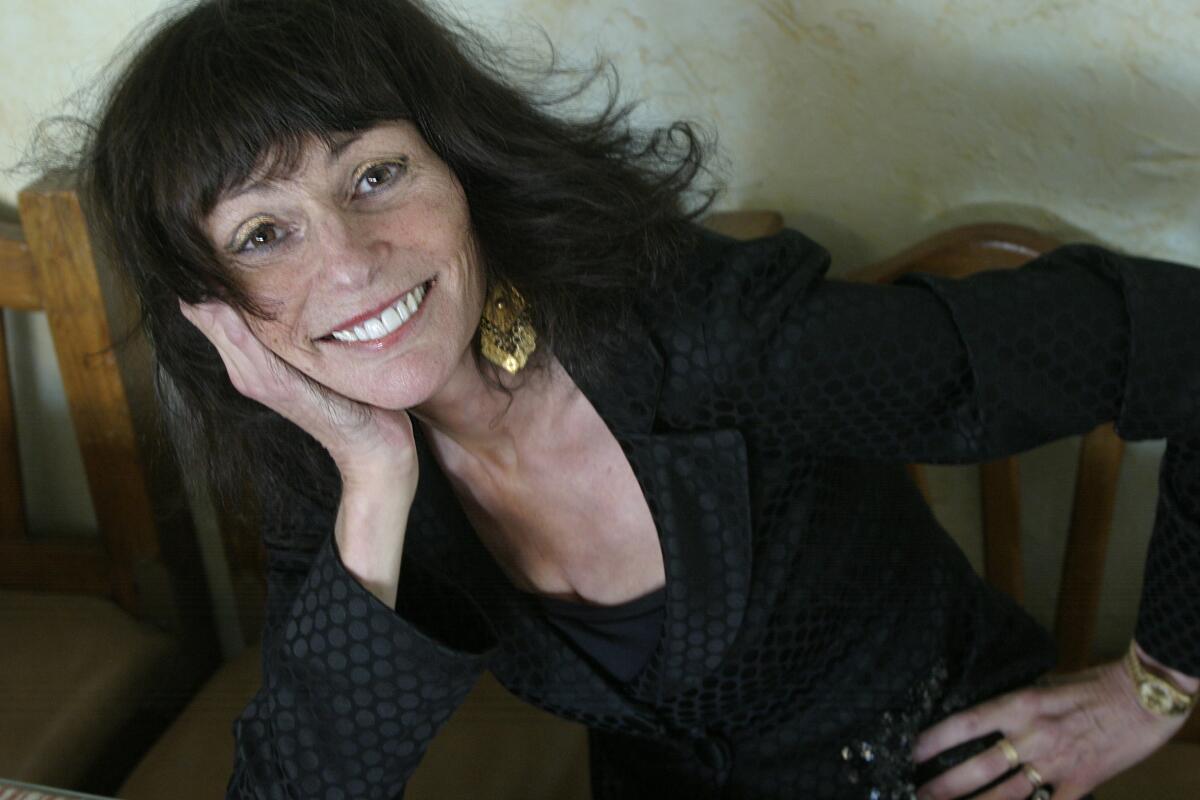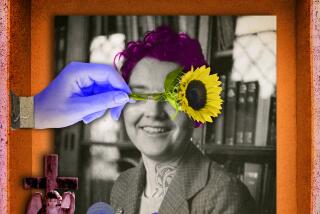Kate Braverman, whose poetry and prose captured a dark Los Angeles, dies in Santa Fe, N.M.

Kate Braverman, a poet, novelist and short-story writer whose work was fueled by a sprawling Los Angeles, has died. She was 70.
Braverman died Sunday in her home in Santa Fe, N.M., novelist Janet Fitch said about her mentor.
“She was vivid and intense. She was uncompromising,” said Fitch, who called Braverman “a high priestess of literature.”
Braverman wrote about extreme female protagonists and her oscillating love and loathing for the city that raised her: Los Angeles inspired much of her writing. She published several books of poetry and countless short stories, including “Mrs. Jordan’s Summer Vacation,” which won the Editor’s Choice Raymond Carver Short-Story Award, and “Tall Tales from the Mekong Delta,” which earned her an O. Henry Award in 1992.
Her book “Frantic Transmissions to and from Los Angeles: An Accidental Memoir,” won the 2006 Graywolf Press Nonfiction Prize.
She is perhaps best known for her fever dream novel “Lithium for Medea.” The 1979 work — described by Joan Didion as “jumpy,” “powerful” and “kinetic” — is about dysfunctional families, addiction and toxic love affairs. Rose, the story’s protagonist, is drawn to a manipulative, cocaine-fueled artist. Braverman wrote it while she was addicted to cocaine, she told The Times in 2006.
In the book, Braverman describes Los Angeles as “white and half dead … a rented city … Los Angeles is the great waiting room of the world,” a hellscape with a “deformed sun” that spits “sick orange blood on the pavement.”
It’s the type of cynical review and dark tone she often used to describe the city. But her work also was poetic. Fitch called it “intensely lyrical,” and said her mentor’s personality wasn’t too different.
“She felt mediocrity was evil and should be stamped out ... it was as if she was defending the fortress from bad writing.”
Braverman believed a writer’s role is to uncover truths most people liked to ignore. “If you are a revolutionary, as I am, that’s what you want to do,” she told the San Francisco Chronicle in 2006.
“I’ve written books as acts of discovery: things I need to know and that I need to touch. And it’s very dangerous work to deal with the most toxic internal elements. ... I feel like Madame Curie at my computer. I feel like I should be hemorrhaging from my eyes and ears.”
Braverman’s characters were often afflicted by isolation and displacement, experiences she knew intimately. “I give a voice to characters outside the so-called American mainstream: Bohemian artists on the canals of Venice, women in the barrio and the new denizen of Los Angeles, the single mom,” she told The Times in 1989. “The character of a poet and a single mother is black humor in itself.
“Everything I write is about Los Angeles ... the dark side of the tropics, the manic nature of the city, its mutant beauty, its power, the wildness of these self-created people.”
Born Feb. 5, 1949, in Philadelphia, Braverman moved with her family to L.A. in 1958. Her father had cancer and was not expected to survive winter in the East, so they trekked to the Golden State. He lived 25 more years.
Braverman received her bachelor’s from UC Berkeley and her master’s in English from Sonoma State University. She was a member of the Venice Poetry Workshop and served on the UCLA Writer’s Program faculty. She taught private workshops out of her L.A. home in the 1990s before packing her bags for the Allegheny Mountains of New York.
She later lived in San Francisco before moving to Santa Fe, where she lived her final years.
But L.A. “was always her spiritual home and North Star,” said Gabrielle Goldstein, her daughter and only survivor.
More to Read
Start your day right
Sign up for Essential California for the L.A. Times biggest news, features and recommendations in your inbox six days a week.
You may occasionally receive promotional content from the Los Angeles Times.







